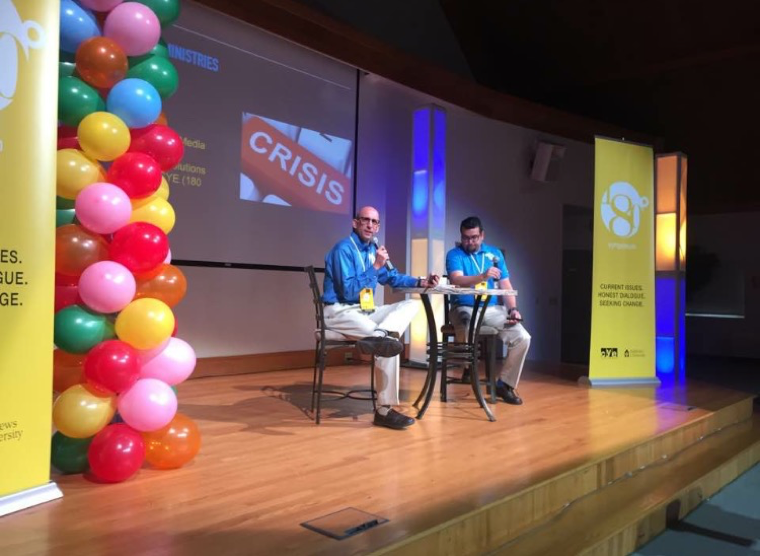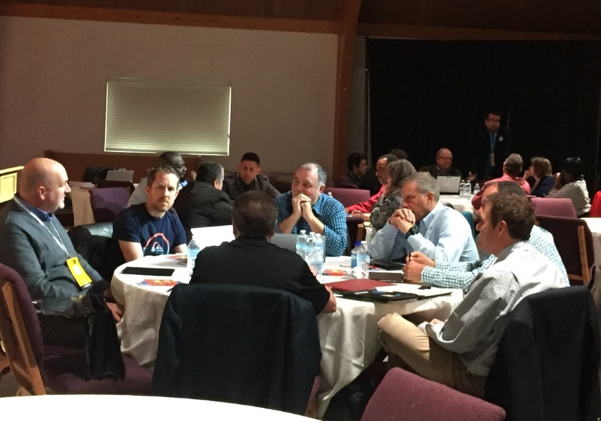
Tracy Wood (left) and Armando Miranda talk about the Sabbath School "crisis" in North America during the 180 Symposium on May 9-11, 2017. Photo by Gerardo Oudri
A group of Sabbath School practitioners, curricula developers, media producers, university professors, and conference, union, and division youth and young adult ministries directors met on May 9-11, 2017, to discuss what many are seeing as a crisis in Earliteen, Youth, and Young Adult Sabbath School across the North American Division. The group convened on the campus of Andrews University in Berrien Spring, Michigan, to pray, discuss, strategize, and commit to the re-visioning, reshaping, rebuilding, and relaunching of Sabbath School ministry for our young people.
The collaborative event, called 180 Symposium, was hosted by the Center for Youth Evangelism with sponsorship from the North American Division Youth and Young Adult Ministries, Andrews University, Lake Union Conference, and the Seventh-day Adventist Theological Seminary.
[CLICK HERE for information on 180 Symposium speakers.]
The Sabbath School “crisis” is multifaceted. Very few conferences and unions provide Sabbath School leader training for Earliteen, Youth, or Young Adult Sabbath School ministry. Because of the many ministries that youth and young adult departments already lead (Adventures, Pathfinders, Master Guide, summer camp, youth, young adults, and public campus ministry) it has been difficult to add Earliteen, Youth, and Young Adult Sabbath School to the list of responsibilities for youth directors. Sabbath School resources such as Guide and Insight magazines continue to decrease in subscriptions, thereby making it a huge financial challenge for continued publication. And, the purpose and focus of Sabbath School has become unclear in many churches across the division as attendance continues to drop.
For two days of the symposium, leaders made 15-minute presentations followed by discussions based on papers and articles they had written covering a vast range of issues relevant to the current Sabbath School crisis. These articles and papers will soon be available online. A book containing the articles will soon be published by AdventSource. This book will be similar to the ones published from previous 180 Symposiums.
On the third day, participants were divided into groups to strategize from what was presented and formulate recommendations for addressing the crisis.

Participants at the 180 Symposium held at Andrews University discuss ways to reinvigorate Sabbath School attendance by youth and young adults. Photo by Angelina Wood
One group focused on the administrative needs and shifts needed to make Sabbath School ministry the primary focus of youth ministries at the churches, the conferences, the unions, and the division. The refocusing of youth ministry on Sabbath School is a huge challenge that will need youth leaders, administrators, and educators at all levels of the church collaborating to create the structural and financial answers to the Sabbath School crisis.
The overall goal is to encourage church, conference, union, and division youth directors and leaders to refocus Sabbath School ministry as the foundational component of Youth Ministry and reposition all activities and events to grow out of Sabbath School ministry at the local church — while involving youth and young adults in the process.
Another group focused on the critical needs of Sabbath School resources available for the local church Earliteen, Youth, and Young Adult Sabbath School leaders. Quarterlies and teacher guides for each age level are provided by the General Conference, but that is all. The Earliteen Sabbath School lessons (RealTime Faith) were embedded into each issue of Guide until January 2017. The Youth Sabbath School lessons (Cornerstone) have been embedded into Insight, but Insight will no longer be produced after the June 3, 2017 edition. No Adventist Church publication has included the lessons of the Collegiate Quarterly for young adults.
The recommendations from the symposium group focused on providing additional creative and relevant resources for Sabbath School leaders that will help them become more successful than ever before. There is, again, a need for collaboration among resource developers in the areas of writing, technology, production, marketing, while intentionally involving youth and young adults in the process.
Sabbath School training for local church leaders has been provided by conference youth directors who have actual experience themselves, and have responded to a desperate cry from Sabbath School leaders and/or parents for help! The Symposium group that focused on leader training and development came up with six recommendations that will need to be developed over the next months. Again, it will take collaboration among Sabbath School practitioners, youth directors, educators, and most importantly youth, to create and facilitate effective training of the resources that will be developed.
It is imperative that youth and young adults are involved in the process of re-visioning, reshaping, rebuilding, and relaunching Earliteen, Youth, and Young Adult Sabbath School because it is all about them.
Can we “give them the keys?” Can they open these doors? Will we involve them as never before in the re-visioning of Sabbath School? Will they give suggestions of how to rebrand Sabbath School in ways that are relevant to them?
The purpose of the online articles and the book is to encourage more leaders, and even more importantly youth and young adults, to participate in re-visioning, reshaping, rebuilding, and relaunching Earliteen, Youth, and Young Adult Sabbath School ministry throughout the North American Division.
Teens and young adults should engage in conversations with their pastor and Sabbath School leaders about what will make their Sabbath School more relevant for them. Pastors should engage in conversation with their conference president and youth directors about what their teens and young adults are telling them. Conference presidents and youth directors should share with their union president and union youth director about what they are hearing from their conference leaders. And, union presidents and youth leaders should discuss with NAD administration and youth leaders about what they have heard will best meet the needs of their teens and young adults. We all are listening because Sabbath School matters!
If you are a Sabbath School leader for grades 9-12 invite your youth to join the conversation around Youth Sabbath School at #SDAYouthVoices. The NAD Youth Ministries department would like to hear from you. Send us a message through our FACEBOOK PAGE. And if you would like to join a Youth Sabbath School Pilot Project that provides additional teacher resources through AdventSource, CLICK HERE.
— Tracy Wood is associate director for Youth Ministries at the North American Division.
